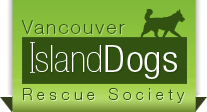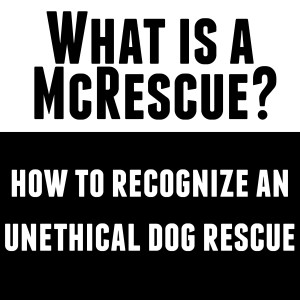What is a ‘McRescue’?
A McRescue is an individual or a group who call themselves a ‘rescue’ but they are not following ethical rescue protocols.
Why the term ‘McRescue’?
McDonald’s is the opposite of wholesome, nutritional foods. It’s fast food. It’s meant for convenience and is characterized by quantity, not quality. McRescues are the opposite of legitimate, ethical rescues. They are the fast food version of real rescues, they cut corners to save time. McRescues only rescue when it is convenient and easy and they strive for quantity at the sacrifice of quality. They have ‘products’ that people want so rely on impulse buyers. They are not transparent with their practices and protocols. McRescues are also known as ‘brokers’ or ‘shufflers.’ The negative impacts fall directly onto the dogs they claim to be helping.
What kinds of protocols do legitimate rescues follow?
Rescues are not governed by anyone but themselves so protocols vary from rescue to rescue. Most reputable rescues follow similar standards of care and protocols making them distinguishable from McRescues. A reputable rescue has written policies that are agreed upon by a Board or directing group, not one person. You will be able to differentiate a rescue from a McRescue by asking about the policies below and receiving concrete answers.
Protocols
Legitimate rescues will always have a stance on the following protocols as they relate to everyday practices in any rescue. McRescues only continue to exist as their practices are rarely questioned but this is changing as the public learns what to look for. All rescues can easily practice these protocol guidelines, there is nothing stopping them but their values and work ethic. You, the public, need to make them accountable because without these protocols, dogs are ultimately paying the price.
What happens if these protocols are followed or not followed?
Legitimate Rescue |
McRescue |
Taking the dog to the vet once the dog enters the rescues physical care |
|
| -Every dog is examined by a vet/vet technician to assess the dog’s health.
-The rescue has a good idea of the dog’s health and are able to tell potential adopters of any known problems. -Local vets are accountable to the rescue and good relationships develop. |
-The dog may be sick and they won’t know. -McRescues are unable to tell potential adopters of health problems and adopters may be surprised by health issues that would have been identified by a vet. -Non-qualified individuals or vet professionals in other countries are not accountable to the rescue or the adopter leaving much room for error. -McRescues may rely on veterinary opinions given before the dog entered their care and disregard the real possibility of infection, disease or parasites picked up en route to the rescue especially if many dogs are transported together. |
Quarantine Period(keeping animals away from public and other animals in case of disease) |
|
| -New dogs are kept away from other dogs and observed for signs of disease, viruses and parasites.
-Dogs do not spread diseases, viruses or parasites to other dogs. |
-Dogs spread diseases, viruses or parasites to other dogs in their care and the public. (Diseases may be mild to severe. Imported dogs may bring in foreign or previously eradicated to our communities.)
–Kennel cough is viewed as a standard occurrence. |
Assessment time for animals before being posted for adoption |
|
| -All dogs being put up for adoption will have completed a set assessment time, normally between 2 weeks and a month.
-This time allows for rescue to identify potential behavioural and health issues and address any concerns by seeking further vetting and/or training advice if required. -Fosters families get to know their dogs so that potential adopters have a good idea what the dog is like. -No dogs are put up for adoption before the standard assessment period has passed. |
-McRescues will post ‘upcoming’ dogs, before they enter care or are assessed, with no information about the dog. They will accept and even encourage applications for these dogs.
-Dog is adopted out based on looks and breed as there is little or no temperament information to go by as dogs need a settling in period for any observations to be of value. -Potential adopters may have their heart set on a dog only to learn well into the adoption process that the dog has behavioural and/or health issues and is not what they are capable of handling. –People adopt a dog only to find out it has behavioural and/or health issues.
|
Adoption Process |
|
| -Rescues have a standard procedure that is followed for every adoption with no exceptions. This includes a thorough application, a home visit and meet and greet with dog and all members of the adoptive family before the rescue approves the home.
-Rescues turn down potential adopters if they are not the right match for the dog. -All dogs have completed their quarantine, assessment period and vetting before being adopted or a set plan for vetting covered by the rescue. |
-McRescues do not follow the application, home visit and meet and greet procedure. They may skip steps, not adequately complete them or not even follow them at all.
-McRescues ask for applications for dogs not yet posted, meaning applicants are applying based on looks and breed rather than temperament and needs of dog. -McRescues adopt dogs to anyone who applies whether they are the appropriate home for the dog’s needs or not. -Dogs are adopted out without undergoing standard quarantine time, proper assessment periods and/or without completed vetting or a set plan for vetting. |
Foster Home Correspondence |
|
| -Rescues support their foster homes and are always available to communicate with them.
-Rescues do not need to post specific dogs and ask for a foster because they have already approved appropriate foster homes and have foster homes lined up before bringing dogs onto their care. |
-McRescues offer little or no support to foster homes. They lose track of who is placed where; They place unaltered dogs with other unaltered dogs of the opposite sex (risking accidental breeding) and in some cases, abandon difficult dogs with foster homes permanently.
-McRescues regularly plead for fosters for specific dogs and rely on people’s heartstrings, not their skills and experience with rehabilitating dogs. |
Return Policies |
|
| -Rescues have return policies in their contract that the dog must be returned to them should the adopter find themselves unwilling or unable to keep the dog. They are prepared to accept every returned dog no matter the circumstance.
-Rescues know that when placing a high number of dogs, returns are inevitable. While returns are rare if a good placement protocol is in place, rescues still have foster homes ready for this situation and extra funds in reserve. |
-McRescues pick and choose who is returned due to excuses such as lack of space and lack of funding.
–There is little or no preparation or forethought to dogs previously adopted out and all returns are seen as a complete surprise. -McRescues’ dogs may end up in shelters or in other rescue’s care. |
Being financially prepared for vet emergencies |
|
| -Reputable rescues only take in the amount of dogs and dogs with health issues that they can financially handle.
-Rescues can focus solely on the dog’s welfare without having to make important quality of life decisions based solely on funds. -Rescues have an operating budget. |
-McRescues take in dogs without having enough funds set aside and urgently request donations from the public. This can result in a dog not receiving care or being euthanized due to lack of funds.
-McRescues do not have an operating budget. |
Acquiring dogs |
|
| -Rescues only take on an amount of dogs that they can properly manage at one time in order to provide the utmost vet care, training, assessment, foster home support and time for performing thorough home visits. | -McRescues pride themselves in quantity. They may run out of funds, not have enough time to invest in properly rehabilitating dogs before they are adopted or have overcrowded foster homes. |
Owner Surrenders |
|
| -Rescues limit the amount of owner surrenders they accept because owner surrenders are not usually true rescues.
-Rescues prefer owners needing to re-home their dogs to do it themselves if possible and provide resources to owners that request rescue services for their dogs.-Rescues need reasonable proof of legal ownership before accepting a dog into their care. -Rescues need reasonable proof of legal ownership before accepting a dog into their care. |
-McRescues take in many dogs surrendered by owners needing to be re-homed rather than dogs needing actual rescue.
-McRescues do not provide information or referrals for people wanting to surrender their dogs. -McRescues look for people freely giving up dogs that are easily adoptable and have no health issues to bring into their care. -McRescues do not check for proper ownership of dog before accepting it into care. This may include taking ‘stray’ dogs into care without looking for their rightful owners. |
Spay and neuter policies |
|
| -Rescues have a vet alter every animal that enters their care at their own cost. There are protocols for animals that are too young or sick and the rescue will arrange for these animals to be altered when the vet deems it to be safe. | -McRescues adopt out unaltered animals that a vet would recommend to be altered at that time.
-McRescues do not have a plan or pay for dogs that are too young or sick to be altered before adopting them out. -McRescues offer discounts for unaltered dogs. -McRescues will offer rebates to the adopter upon proof of alter that adopter arranges and pays for up front themselves. |
Advocating for the root of the problem |
|
| -Rescues advocate for spaying & neutering of the public’s pets.
-Depending on capacity and funds available, rescues may offer free spays & neuters to selected people and communities. -Rescues may have a trap-neuter-return policy for feral colonies. -Rescues take in the mother of any litter of puppies rather than just the puppies. -Rescues may volunteer with other organizations that promote responsible pet ownership and/or offer spay & neuter clinics. |
-McRescues do not focus on responsible pet ownership. They do not offer any side programs, online resources or information on how to reduce the problem of pet overpopulation.
-McRescues take in a litter of puppies but not the mother even when she is in need of help too. -McRescues may be completely unaware that they are even part of the problem. |
Medical Records(Records may or may not be fully released depending on confidentiality protocols.) |
|
| -Rescues are able to offer proof of current vaccinations and spay or neuter.
-Medical records have previous owner information blocked out to preserve confidentiality of previous owner as this follows best practice. |
-McRescues may not have proof of medical history or refuse to release it. –Medical records may be difficult to verify as they are out of country or in another language. They may even be falsified.-Medical records with previous owner name or contact information is given. |
Governance |
|
| -Rescues have a mission with a specific goal. -Rescues have standard written policies by which they abide.-Exceptional rescues will have strategic plans and visions and follow them.-Rescues are most often registered not-for-profit societies with a Board of Directors. |
-McRescues are directionless and do not have specific goals to reach beyond adopting out dogs.
-McRescues do not have written protocols or do not follow them. -McRescues can appear legitimate by being registered not-for-profit societies but as there is no provincial governing body for rescues, can still be operating unethically. |
If you are looking to adopt, foster or surrender a dog to a rescue, use this guide as a reference to help you determine whether they are a legitimate rescue with their first priority being ethical rescue. Support your local ethical rescues and speak out for what is right!
TAKE ACTION
Send any rescue this list of question to help you determine whether you should go ahead and deal with them or not:
Hi,
I am looking to adopt a dog from a rescue organization but want to make sure that I am supporting an ethical rescue organization. If you could take the time to answer a few of my questions it would be appreciated.
1. Do all dogs see a vet after you receive them? If not, why not?
2. How long do you hold your dogs for before they are put up for adoption? Does this period include quarantine?
3. What is your standard adoption process?
4. Do you accept dogs back that you’ve previously adopted out even if they have developed behavioural problems?
5. What kind of rehabilitation do your dogs receive if they need it?
6. Where do you acquire your dogs from and how can you be sure the dog doesn’t have an owner looking for them?
7. Do you cover vaccinations and spay/neuters prior to adoption? If not, is the cost and scheduling up to you or myself as the adopter?
8. Does your rescue have a written mission statement, written policies and a strategic plan? May I have a copy?
9. What does your rescue do to teach responsible pet ownership and help stop the root of the problem being pet overpopulation?Thank you for taking the time to answer my questions.
Sincerely,


